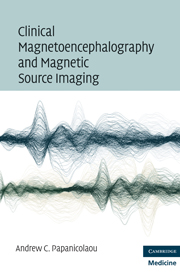Book contents
- Frontmatter
- Contents
- Contributors
- Preface
- Section 1 The method
- Section 2 Spontaneous brain activity
- Section 3 Evoked magnetic fields
- Postscript: Future applications of clinical MEG
- Overview
- Normal aging and neurodegenerative disorders
- Neurodevelopmental disorders
- Psychiatric disorders
- Neurological disorders
- Functional reorganization
- References
- Index
Overview
from Postscript: Future applications of clinical MEG
Published online by Cambridge University Press: 01 March 2010
- Frontmatter
- Contents
- Contributors
- Preface
- Section 1 The method
- Section 2 Spontaneous brain activity
- Section 3 Evoked magnetic fields
- Postscript: Future applications of clinical MEG
- Overview
- Normal aging and neurodegenerative disorders
- Neurodevelopmental disorders
- Psychiatric disorders
- Neurological disorders
- Functional reorganization
- References
- Index
Summary
The focus of this handbook thus far has been to provide a procedural account of the technique of MEG/MSI, but in this postscript we address the potential future applications of clinical MEG. We review the potential utility of MEG/MSI as an adjunct to established clinical procedures used to diagnose – as well as predict – certain pathological states. This review summarizes research that has employed MEG/MSI to determine the neurophysiological profile of various disorders on the basis of recordings of spontaneous activity and/or activation recorded during sensorimotor and cognitive tasks.
First, we will review the applications of MEG in identifying normal age related changes in cognition and acknowledge studies that have sought to characterize neurodegenerative disorders on the basis of patterns of abnormal MEG activity. Second, we assess the role of MEG in complementing the clinical profile of neurodevelopmental disorders and discuss the advent of more novel recording techniques for assessing fetal brain activity. Third, we review the contribution of MEG/MSI in distinguishing individuals with various psychiatric and neurological disorders. Finally, we comment on the efficacy of MEG/MSI in evaluating functional reorganization of the brain following cerebral insult, including its ability to predict clinical outcomes.
- Type
- Chapter
- Information
- Publisher: Cambridge University PressPrint publication year: 2009

